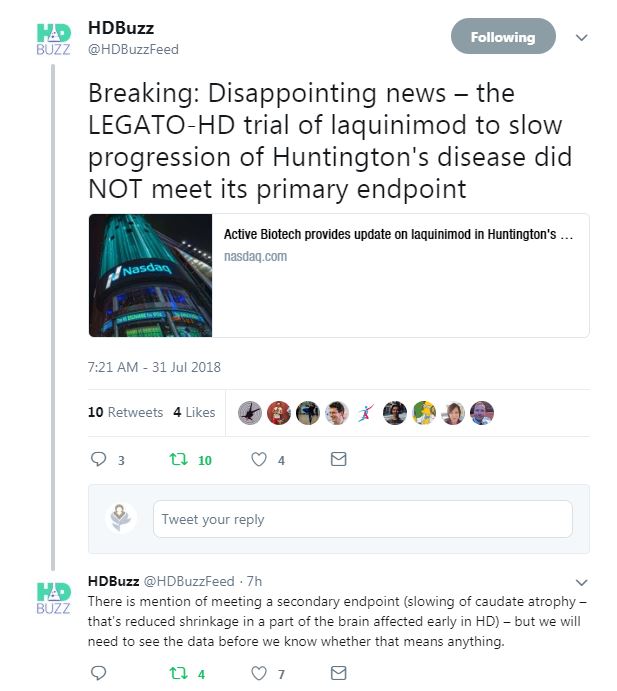
Active Biotech releases new updates on Legato-HD trial in recent press release:
(Lund Sweden) July 31, 2018 – Active Biotech (NASDAQ OMX NORDIC: ACTI) today provided an update regarding the clinical development of laquinimod by Teva Pharmaceutical Industries Ltd. The Phase 2 LEGATO-HD trial evaluating the safety and efficacy of laquinimod as a treatment in Huntington’s disease (HD) did not meet its primary endpoint of change from baseline after 12 months of treatment, as measured by the Unified Huntington’s Disease Rating Scale – Total Motor Score (UHDRS-TMS). The study’s secondary endpoint, reduction of brain atrophy (measured by caudate volume) was met. The safety results were similar to the expected event profile in this patient population.
Study data will be fully analyzed. Teva will submit study results for presentations at future medical meetings and publication in peer-reviewed journals.
ABOUT LEGATO-HD
LEGATO-HD is a multicenter, multinational, randomized, double-blind, placebo-controlled, parallel-group Phase 2 study of laquinimod as a potential treatment in patients with HD. The study was designed to evaluate three doses arms (0.5mg, 1.0mg, and 1.5mg daily) versus placebo. Cardiovascular safety concerns were observed in multiple sclerosis studies with laquinimod doses of 1.2mg and 1.5mg. Although no similar concern was identified in LEGATO-HD, Teva discontinued the 1.5mg arm in January 2016 as a precautionary safety measure and continued to evaluate the efficacy and safety of the 0.5mg and 1.0mg doses.
Overall, 352 patients were randomized. At baseline, there were similar numbers of males and females with a mean age of 43.9 years, mean UHDRS-TMS score of 24.4, and mean UHDRS-Total Functional Capacity (TFC) score of 11.1. 287 patients completed the study and 65 terminated early, including the 30 patients who stopped study when the 1.5 mg dose was terminated.
The primary endpoint evaluated the change from baseline at month 12 in the UHDRS-TMS for the 1.0 mg dose as compared to placebo. The secondary endpoint measured the percent caudate atrophy (the percent change in caudate volume) from baseline at month 12 in the 1.0 mg dose as compared to placebo. Exploratory outcomes included the change in the UHDRS-TMS and the percent caudate atrophy both for the 0.5 mg dose, and changes in measures of motor function, cognitive function, functional capacity, and brain volumes for the 1.0 and 0.5 mg doses individually. Safety measures included adverse event reporting, clinical laboratory tests, vital signs, electrocardiograms, physical examinations, and suicidality.
For more information about the Legato-HD trial, click here.
If you have questions about the Legato-HD trial, please contact your local neurologist, Movement Disorders or Huntington disease clinic.

